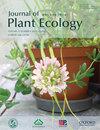Correction of leaf nutrient resorption efficiency on the mass basis
IF 3.9
2区 环境科学与生态学
Q2 ECOLOGY
引用次数: 0
Abstract
Nutrient resorption is a crucial mechanism for plant nutrient conservation, but most previous studies didn’t consider the leaf-mass loss during senescence for lack of measured data, leading to an underestimation of nutrient resorption efficiency (NuRE), or had to calculate NuRE of various species based on the average mass loss at plant-functional-group level in the literature, which affected its accuracy. We here measured the leaf-mass loss to correct NuRE with the species-specific mass loss correction factor (MLCF), so as to foster a more accurate calculation of the nutrient fluxes within and between plants and the soil. Green leaves and senesced leaves were collected from 35 dominant woody plants in northern China. Mass of green and senesced leaves were measured to calculate the MLCF at species level. The MLCF was reported for each of the 35 dominant woody plants in northern China. These species averagely lost 17% of the green-leaf mass during leaf senescence, but varied greatly from 1.3%~36.8% mass loss across the 35 species, or 11.7%~19.6% loss across the functional types. Accordingly, the MLCF varied from 0.632~0.987 across the 35 species with an average value 0.832. The NuRE corrected with MLCF was remarkably increased on the whole (e.g., both the average nitrogen and phosphorus NuRE became about 9% higher, or more accurate), compared with the uncorrected ones, especially in the case of low resorption efficiencies. Our field data provides reliable references for the MLCF of plants in related regions at both species and functional-type levels, and is expected to promote more accurate calculations of NuRE.叶片养分吸收效率在质量基础上的修正
养分吸收是植物养分保持的重要机制,但由于缺乏实测数据,以往的大多数研究都没有考虑衰老过程中的叶片质量损失,导致对养分吸收效率(NuRE)的低估,或者不得不根据文献中植物功能组水平的平均质量损失来计算各种物种的NuRE,这影响了它的准确性。我们在这里测量了叶片质量损失,以使用物种特异性质量损失校正因子(MLCF)校正NuRE,从而促进对植物和土壤内部和之间的营养通量进行更准确的计算。从我国北方35种主要木本植物中采集了绿叶和衰老叶。测量绿色和衰老叶片的质量,以计算物种水平上的MLCF。对中国北方35种主要木本植物的MLCF进行了报道。这些物种在叶片衰老过程中平均损失了17%的绿叶质量,但差异很大,35个物种的质量损失为1.3%~36.8%,不同功能类型的损失为11.7%~19.6%。因此,35个物种的MLCF在0.632~0.987之间变化,平均值为0.832。与未校正的相比,用MLCF校正的NuRE总体上显著增加(例如,平均氮和磷的NuRE都变得高出约9%,或更准确),特别是在吸收效率低的情况下。我们的实地数据为相关地区植物在物种和功能类型水平上的MLCF提供了可靠的参考,并有望促进NuRE的更准确计算。
本文章由计算机程序翻译,如有差异,请以英文原文为准。
求助全文
约1分钟内获得全文
求助全文
来源期刊

Journal of Plant Ecology
生物-植物科学
CiteScore
4.60
自引率
18.50%
发文量
134
审稿时长
3 months
期刊介绍:
Journal of Plant Ecology (JPE) serves as an important medium for ecologists to present research findings and discuss challenging issues in the broad field of plants and their interactions with biotic and abiotic environment. The JPE will cover all aspects of plant ecology, including plant ecophysiology, population ecology, community ecology, ecosystem ecology and landscape ecology as well as conservation ecology, evolutionary ecology, and theoretical ecology.
 求助内容:
求助内容: 应助结果提醒方式:
应助结果提醒方式:


